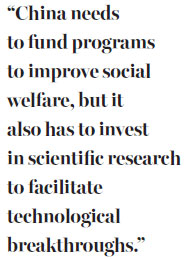There are good reasons to build a supercollider
Updated: 2016-09-16 07:10
(China Daily Europe)
|
|||||||||
Editor's note: Chen-Ning Yang, a Chinese-American physicist and Nobel laureate, recently advised China not to build a supercollider, suggesting that the huge investment required for such a project could be better spent on social programs and other research. Two physicists, Wang Yifang and Chen Xin, here give their response.
Progress will be worth the investment
Professor Chen-Ning Yang's first argument in opposing the supercollider is the high cost. He cites the United States' superconducting supercollider, which was initially budgeted at $3 billion in 1989 but abandoned three years later due to rapidly rising costs. Yang said China should not repeat the mistake made by the US.
Yet the US supercollider failed because of multiple reasons, among them being a US federal government budget deficit, political struggles between the Democratic and Republican parties, and competition between Texas and other states.
This would not be the case in China. The Chinese Academy of Sciences' Institute of High Energy Physics has built a number of large-scale scientific facilities, including Beijing's electron positron colliders. All costs were well controlled. There is no reason to expect China's supercollider will exceed its budget.
Yang also says the investment in such a huge project would mean less funding for programs to improve people's livelihoods and social welfare. Of course, China needs to fund programs to improve social welfare, but it also has to invest in scientific research to facilitate technological breakthroughs.
Furthermore, progress in high-energy physics will actually help to improve people's livelihoods. Today, hospitals use MRI devices to diagnose diseases, we have touch screens on our smartphones and we have the web for sharing information. Without pursuing research in high-energy physics for the past 70 years, and the technology innovations associated with it, all these would have been impossible, or at least significantly delayed.
For China, a supercollider will allow its scientists to keep abreast of the latest developments in physics, enabling the country to become a global research center. That's irreplaceable to its development in the long run.
The budget for a supercollider will not take funds from other research programs. Basic research accounts for only 5 percent of research and development funding in China.
The Chinese leadership has vowed to increase investment in basic research, with funds increasing by 100 billion yuan ($15 billion; 13.3 billion euros) a year. By comparison, the planned supercollider would require 3 billion yuan a year between 2022 and 2032 for its first stage. Therefore, it will not squeeze funds for basic research.
Yang was also pessimistic about building Chinese particle accelerators in the 1970s, yet the returns from the program were well worth the investment: The science resulting from Beijing's electron positron colliders and the expertise acquired through experimental programs was vital to the successful building of the Daya Bay Reactor Neutrino Experiment, a multinational collaboration in Hong Kong, while the synchrotron radiation facilities and neutron spallation sources constructed to serve the broader scientific community are also examples of good investment returns.

We should listen more to young scientists on the front line, who will carry China's science programs to the next level. We believe a supercollider in China will help in a big way.
Wang Yifang is director of the Chinese
Academy of Sciences' Institute of High Energy Physics. The views do not necessarily reflect those of China Daily.
Public discussion on program welcome
The fact that Chen-Ning Yang used the mass media rather than a professional journal to disseminate his ideas is welcome, as the issue should be discussed not only by physicists, but also taxpayers because it's their money that will fund the supercollider program. Also, this will allow scientists to share their views with the public, which rarely happens.
Physicists believe supercolliders are necessary for the advancement of physics, but to build one, a country needs to have enough money, thoroughly discuss the issue, and cooperate with other countries in technology. China meets all these requirements.
There are fears the supercollider could take away a huge percentage of China's budget for basic research. But the cost - 3 billion yuan ($449 million; 399 million euros) a year between 2022 and 2032 - is not high considering the total research budget. In addition, a supercollider will help China catch up with the advanced world in science.
More importantly, particle physics advances on the basis of repeated experiments. Only when China has a supercollider to conduct experiments will its scientists be able to improve their research. Taxpayers should realize that the investment in a supercollider will yield promising returns because it will help upgrade technologies as a whole.
Chen Xin is an associate professor of physics at Tsinghua University. The views do not
necessarily reflect those of China Daily.
(China Daily European Weekly 09/16/2016 page13)
Today's Top News
UK gives Hinkley Point nuclear power green light
Hillary Clinton remains healthy: doctor
UK confirms Hinkley project with 'new agreement'
Despite big deals, data shows less M&As after Brexit
New plan for grammar schools welcomed by Chinese
Moscow denies involvement in hacker attacks on WADA
EU should stay strong, stable and united: Tusk
Cameron to quit as MP; by-election triggered
Hot Topics
Lunar probe , China growth forecasts, Emission rules get tougher, China seen through 'colored lens', International board,
Editor's Picks

|

|

|

|

|

|







